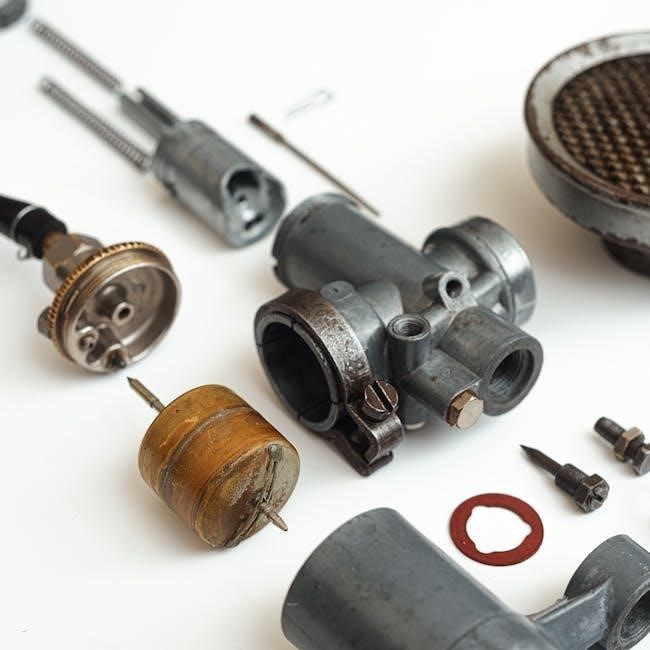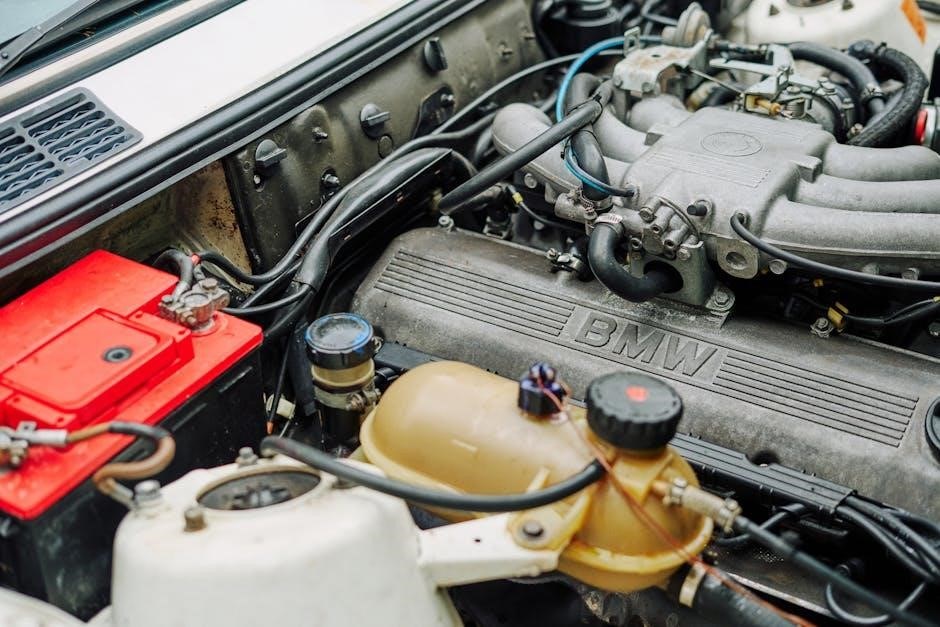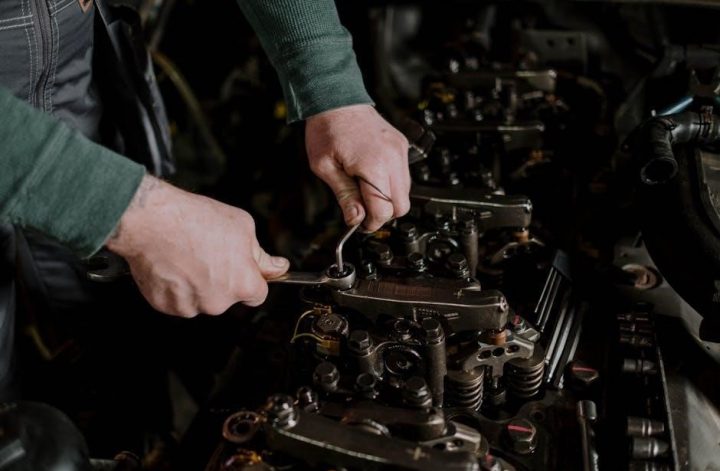Overview of the Detroit Diesel Series 60 12.7-Liter Engine
The Detroit Diesel Series 60 12.7-liter engine is renowned for its robust construction and impressive torque output, making it a reliable choice for heavy-duty applications. Known for its durability, this engine is widely used in trucks and industrial machinery, offering a balance of power and fuel efficiency. Its design emphasizes longevity and performance, supported by comprehensive service manuals and electronic control systems like DDEC, ensuring optimal operation and maintenance.
1.1 Key Features and Specifications
The Detroit Diesel Series 60 12.7-liter engine features a 12.7-liter displacement, producing up to 500 horsepower and 1,850 lb-ft of torque. It includes a 6-cylinder inline configuration, overhead camshaft, and direct fuel injection. The engine is equipped with a DDEC electronic control system, ensuring precise fuel management and emissions compliance. Designed for heavy-duty applications, it offers a robust cooling system and durable construction, making it suitable for long-haul trucks and industrial machinery.
1.2 Historical Significance and Applications
Introduced in the early 1980s, the Detroit Diesel Series 60 12.7-liter engine became a cornerstone in heavy-duty trucking and industrial machinery. Known for its durability and fuel efficiency, it powered long-haul trucks, construction equipment, and marine applications. Its reliability made it a preferred choice for demanding environments, solidifying its reputation as a workhorse in the diesel engine industry for decades.

Structure and Components of the Series 60 Engine
The Series 60 engine features a robust design with a cast-iron engine block, aluminum cylinder heads, and a centralized cooling system. Its components are engineered for durability and optimal performance, ensuring reliability in demanding applications. The engine’s structure balances strength and efficiency, making it a durable choice for heavy-duty use.
2.1 Major Engine Components
The Detroit Diesel Series 60 12.7-liter engine comprises a cast-iron block, aluminum cylinder heads, and a steel crankshaft. Key components include forged steel connecting rods, high-strength pistons, and a turbocharged air system. The engine also features a fuel injection system, electronic control modules, and a cooling system designed for heavy-duty applications. These components ensure durability, power, and efficiency in various industrial and trucking uses. Proper maintenance is essential for longevity.
2.2 Engine Block and Cylinder Head Design
The Detroit Diesel Series 60 12.7-liter engine features a robust cast-iron engine block, known for its strength and durability. The cylinder heads are crafted from high-strength aluminum, ensuring excellent thermal efficiency and heat dissipation. The design incorporates a one-piece cylinder head configuration, enhancing reliability and reducing potential leak paths. The engine block also houses a central gear train, contributing to smooth operation and reduced noise levels, making it ideal for heavy-duty applications.

Maintenance and Service Schedule
Regular maintenance is essential for the Detroit Diesel Series 60 12.7-liter engine to ensure optimal performance and longevity. Routine checks, oil changes, and filter replacements are critical.
3.1 Recommended Maintenance Intervals
Regular maintenance intervals for the Detroit Diesel Series 60 12.7-liter engine include oil changes every 15,000 to 25,000 miles, filter replacements every 10,000 miles, and coolant checks annually. Fuel injectors and belts should be inspected every 30,000 miles. Adhering to these schedules ensures optimal performance, reduces wear, and prevents costly repairs. Always refer to the official service manual for specific guidelines tailored to your engine’s usage and operating conditions.
3.2 Essential Servicing Procedures
Essential servicing for the Detroit Diesel Series 60 12.7-liter engine includes oil and filter changes, inspection of fuel injectors, and replacement of air and fuel filters. Belts and hoses should be checked for wear, and coolant levels must be maintained. Proper torque specifications for cylinder head bolts and other critical components are outlined in the official service manual. Regular cleaning of fuel injectors and monitoring of DDEC system alerts ensure optimal performance and longevity.
DDEC Electronic Control Systems
The DDEC system optimizes engine performance, fuel efficiency, and emissions through advanced electronic controls. It offers diagnostics and real-time monitoring, ensuring precise management of engine operations.
The DDEC (Detroit Diesel Electronic Controls) systems represent advanced engine management technologies. DDEC II introduced electronic fuel injection and basic diagnostics, while DDEC III enhanced performance with improved fuel efficiency and emissions control. DDEC IV incorporates sophisticated diagnostics, real-time monitoring, and compliance with stricter emission standards. These systems integrate seamlessly with the Series 60 engine, optimizing power output and reducing operational costs through precise control of engine functions.
4.2 Troubleshooting Common DDEC Issues
Troubleshooting DDEC systems involves identifying error codes and addressing sensor malfunctions, fuel system issues, or wiring faults. Common problems include faulty oxygen sensors, stuck injectors, or corrupted software. Diagnostic tools like Detroit Diesel’s proprietary software can help pinpoint issues. Regular system updates and adherence to repair manuals are crucial for resolving errors. Persistent problems may require consultation with authorized service centers to ensure proper calibration and functionality.

Engine Performance and Optimization
The Detroit Diesel Series 60 12.7-liter engine is engineered for superior power and efficiency, delivering high torque output for demanding applications while maintaining fuel economy through advanced design.
5.1 Maximizing Fuel Efficiency
Maximizing fuel efficiency for the Detroit Diesel Series 60 12.7-liter engine involves optimizing driving habits, maintaining proper tire pressure, and ensuring regular servicing. Utilizing DDEC systems, which monitor fuel consumption, helps in identifying areas for improvement. Additionally, reducing idling time and employing fuel-efficient gear shifting can significantly enhance overall fuel economy, reducing operational costs and environmental impact.
5.2 Enhancing Power Output
Enhancing power output for the Detroit Diesel Series 60 12.7-liter engine can be achieved through upgrades like turbocharger optimization and tuning adjustments. Ensuring proper engine calibration and using high-performance fuel can also boost power. Regular maintenance, such as cleaning fuel injectors, helps maintain peak performance. Additionally, upgrading engine components like intercoolers and exhaust systems can further enhance power output, making the engine more efficient for demanding applications.
Common Repairs and Overhaul Procedures
Common repairs for the Detroit Diesel Series 60 12.7-liter engine include cylinder head replacements, turbocharger servicing, and fuel injector overhauls. Regular engine rebuilds ensure longevity.
6.1 Rebuilding the Engine
Rebuilding the Detroit Diesel Series 60 12.7-liter engine involves a thorough disassembly, inspection, and replacement of worn components. The process includes renewing piston rings, bearings, and cylinder liners. The engine block and crankshaft are inspected for wear and resurfaced if necessary. Genuine Detroit Diesel parts are recommended to ensure reliability. Reassembly follows precise torque specifications, and the engine is tested to restore it to original performance standards.
6.2 Replacement of Critical Components
Replacing critical components in the Detroit Diesel Series 60 12.7-liter engine requires precision and adherence to factory specifications. Key components like fuel injectors, turbochargers, and cylinder heads must be replaced with genuine Detroit Diesel parts to ensure reliability. Proper tools and experienced technicians are essential for handling these replacements, as incorrect installation can lead to further damage or reduced engine performance. Regular maintenance helps identify worn-out parts early, preventing costly engine failures.

Diagnostic Techniques and Tools
Advanced diagnostic tools, including DDEC systems and fault code readers, enable precise identification of engine issues. These tools help technicians quickly pinpoint and resolve problems efficiently.
7.1 Using Diagnostic Software
The Detroit Diesel Series 60 12.7-liter engine utilizes DDEC diagnostic software for precise troubleshooting. This software connects to the engine’s electronic control system, enabling real-time data monitoring and fault code retrieval. Technicians can identify issues quickly, review historical data, and perform guided diagnostics. Regular software updates ensure compatibility with the latest engine technologies, making it an essential tool for maintaining optimal engine performance and resolving problems efficiently.
7.2 Interpretation of Fault Codes
Fault codes for the Detroit Diesel Series 60 12.7-liter engine are generated by the DDEC system, providing critical insights into engine issues. These codes help technicians identify specific problems, such as sensor malfunctions or fuel system irregularities. Proper interpretation requires knowledge of DDEC diagnostics and the service manual. Accurate code analysis ensures timely repairs, preventing further damage and maintaining engine performance. Training and experience are essential for effective fault code interpretation.

Emission Control and Compliance
The Detroit Diesel Series 60 12;7-liter engine complies with stringent emission standards, utilizing advanced technologies like EGR and diesel particulate filters to minimize environmental impact and meet regulations.
8.1 Emission Standards for Series 60 Engines
The Detroit Diesel Series 60 12.7-liter engine meets stringent EPA standards, incorporating technologies like Exhaust Gas Recirculation (EGR) and Diesel Particulate Filters (DPF) to reduce emissions. These systems effectively minimize nitrogen oxides and particulate matter, ensuring compliance with both federal and state regulations. The engine’s design emphasizes environmental responsibility while maintaining performance, making it a compliant choice for heavy-duty applications.
8.2 After-Treatment Systems
The Detroit Diesel Series 60 12.7-liter engine features advanced after-treatment systems, including Diesel Particulate Filters (DPF) and Selective Catalytic Reduction (SCR). These systems work together to reduce emissions by capturing particulate matter and converting nitrogen oxides into harmless gases. Regular maintenance of these systems, as outlined in the manual, ensures optimal performance and compliance with environmental regulations, while preventing costly repairs and downtime.
Safety Precautions and Best Practices
Always wear PPE, ensure proper ventilation, and follow manual guidelines to handle the Detroit Diesel Series 60 engine safely, preventing accidents and ensuring optimal performance.
9.1 Safe Handling of Engine Components
When handling Detroit Diesel Series 60 components, wear protective gear like gloves and safety glasses. Use approved lifting tools to avoid damage or injury. Ensure components are securely fastened during transport. Always refer to the manual for specific handling instructions to prevent accidents and maintain engine integrity. Proper storage and organization of parts are crucial for safety and efficiency.
9.2 Proper Use of Tools and Equipment
Always use tools and equipment specifically recommended by Detroit Diesel for the Series 60 engine. Ensure tools are well-maintained and calibrated to prevent damage or injury. Refer to the manual for guidance on tool selection and usage. Properly secure tools during procedures to avoid accidental damage to engine components. Organize tools neatly to maintain a safe and efficient workspace while servicing the engine.

Resources and References
Consult official Detroit Diesel manuals and online forums for detailed guides and troubleshooting tips. Manufacturer-approved service bulletins and repair manuals are essential for accurate maintenance and diagnostics.
10.1 Official Detroit Diesel Manuals
Official Detroit Diesel manuals provide comprehensive guides for servicing the Series 60 12.7-liter engine. These manuals include detailed instructions, diagrams, and specifications for maintenance, troubleshooting, and repairs. They cover DDEC systems, engine components, and emission controls, ensuring technicians have precise information. Available in multiple formats, these manuals are indispensable for professionals working on Detroit Diesel engines, promoting efficiency and accuracy in service procedures and compliance with manufacturer standards for optimal performance and longevity.
10.2 Online Forums and Communities
Online forums and communities dedicated to the Detroit Diesel Series 60 12.7-liter engine are invaluable resources for technicians and enthusiasts. These platforms offer troubleshooting advice, repair guidance, and shared experiences. Users can access repair manuals, diagnostic tips, and discussions on performance optimization. Active participation from professionals and hobbyists ensures a wealth of knowledge is available, making these forums essential for staying informed and resolving engine-related challenges effectively.

Environmental Impact and Disposal
The Detroit Diesel Series 60 engine’s environmental impact requires proper disposal of fluids and recycling of parts to minimize ecological harm and meet regulations.
11.1 Proper Disposal of Engine Fluids
Proper disposal of engine fluids from the Detroit Diesel Series 60 12.7-liter engine is critical for environmental protection. Oil, coolant, and fuel must be drained and recycled according to local regulations to prevent contamination. Use approved containers and facilities for disposal. Improper disposal can lead to soil and water pollution, posing risks to ecosystems and human health. Always follow safety protocols and consult official guidelines for compliance.
11.2 Recycling and Reuse of Parts
Recycling and reusing parts from the Detroit Diesel Series 60 12.7-liter engine is environmentally beneficial and cost-effective. Many components, such as engine blocks, cylinder heads, and turbochargers, can be remanufactured to meet OEM specifications. Proper recycling reduces landfill waste and conserves resources. Always use authorized facilities for recycling to ensure compliance with environmental regulations and maintain the integrity of the engine components during reuse.

Future Developments and Upgrades
The Detroit Diesel Series 60 12.7-liter engine may see future upgrades in emission reduction technologies and advanced electronic control systems for improved efficiency, compliance, and performance.
12.1 Upcoming Technological Advancements
Future advancements for the Detroit Diesel Series 60 12.7-liter engine may include enhanced emission reduction technologies, improved fuel efficiency systems, and integration of hybrid power solutions. Researchers are exploring eco-friendly materials and advanced manufacturing techniques to increase engine longevity. Additionally, next-generation electronic control systems, such as AI-driven optimizations, could further improve performance and reduce environmental impact, ensuring compliance with evolving emission standards.
12.2 Retrofitting Older Models
Retrofitting older Detroit Diesel Series 60 12.7-liter engines involves upgrading outdated components to meet modern standards. This can include installing newer emission control systems, such as improved DPF or SCR technologies, to reduce environmental impact. Additionally, replacing legacy electronic controls with advanced DDEC systems enhances performance and fuel efficiency. Retrofitting also allows for the integration of modern diagnostic tools, ensuring older engines remain reliable and compliant with current regulations.




